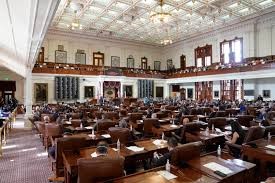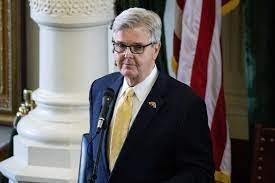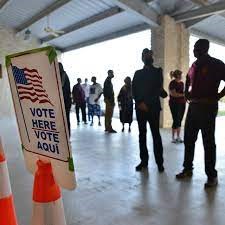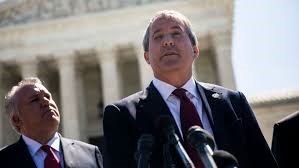
Here’s a quick recap of what happened over the last week:
Special Session Update

The 3rd special session ended very unceremoniously on Tuesday with very little accomplished during the 30-day period. The only things that passed were the bill prohibiting private employers from mandating their employees have the COVID vaccine and the bill to increase the penalties for human smuggling and operating a stash house. Legislation on school vouchers, the Colony Ridge development, more funding for the border wall, or anything related to illegal migration failed.
The legislature seems to be no closer on an agreement on school voucher legislation now than when they started this special session. Or from when the voucher legislation failed during the regular session. Furthermore, the Lt. Governor and House Speaker continue their war of words through twitter, blaming the other for the failure of not only the voucher legislation, but also the legislation related to border security issues.
But that didn’t stop Gov. Abbott from calling an unprecedented fourth special session that started on Tuesday evening. The state of Texas has never had more than three special sessions in one calendar year until now. The last time three were called was in 1990, when the Texas Supreme Court ruled the state’s public school finance system unconstitutional, and lawmakers were forced into special session to develop an entirely new system of funding public schools.
Each special session costs Texas taxpayers somewhere between $1.2 and $2 million. All legislators receive a $221 daily stipend for expenses for the entire 30-day special session. Add to that the costs of additional staff and Capitol operations during a special session and the tab could easily reach $2 million per special session.
Issues relative to border security – as mentioned above – failed during the third called session mainly due to political bickering between the Speaker and Lt. Governor. However, this session seems to be yielding an agreement between the chambers on border security issues. The House and Senate have filed identical measures that would empower Texas law enforcement officers to arrest undocumented immigrants and require that individual to be deported from the US in lieu of prosecution. Previous versions from each chamber differed, but under the new legislation for this session, both chambers are authorizing the arrest of anyone entering the country illegally, perform a background check on the individual, and then taken to a port of entry for deportation. The House held a hearing on the legislation yesterday and passed it out of committee along partisan lines. The full Senate passed their bill yesterday, so the full House will now be able to consider the measure on the floor next week.
The two chambers have also filed identical measures relative to funding for continued construction of the border wall. The chambers were basically in agreement on this issue last session, but time ran out before both chambers could pass the legislation. Both chambers have filed bills to appropriate $1.5 billion for extension of the border wall. The bills also contain $40 million to be appropriated to the Department of Public Safety for increased operations and personnel relative to the Colony Ridge Development in Liberty County, which has garnered attention due to rumored high crime rates and increasing numbers of undocumented immigrants settling there. This measure was also passed by the Senate yesterday and will now head to the House for consideration. The House will have a committee hearing on the bill today, and will consider it on the floor early next week.
Lt. Governor Diagnosed with Pneumonia

As the 3rd special wound down and preparations began for the 4th session, Lt. Governor Dan Patrick announced he was suffering from viral pneumonia. His office said the illness would prohibit the Senate’s presiding officer from participating in any meetings or engagements for the next several days, and that he would be recovering and working from home. However, Patrick continues to communicate through his staff and statements on twitter, and has committed that the Senate is ready to proceed with the 4th special session.
New Voucher Bill Filed

So, with the border/immigration related legislation seemingly on track to pass both chambers, the only remaining issue to be considered is school choice, or voucher legislation.
House Public Education Committee Chairman Brad Buckley (R, Salado) has announced a new voucher proposal that he has filed for consideration in the House for this fourth special session. The new proposal significantly increases the per student allotment for public schools and also adds accountability measures for students participating in the new voucher program. Buckley’s latest proposal prioritizes students with disabilities and those from low-income families for the new voucher program, and has funding of $500 million, which would cover about 40,000 students. Students involved in the program would be required to take standardized tests every two years to ensure they are keeping up academically. This particular provision is a non-starter for the Senate, that says the voucher program should be free of any state interference. Buckley’s new proposal also adds a one-time $4,000 bonus for all Texas teachers and other school employees and has funding to assist districts with teacher retention.
The committee hearing for this new voucher legislation began in the House yesterday, and will continue today. There has been no indication that this new proposal will garner support from the Democrats or Republicans from rural areas in the House – who have consistently banded together to oppose voucher legislation.
The Senate yesterday passed the same version of the voucher legislation that they passed during the regular session and the previous special session. The Senate version creates a $500 million fund accessible to parents to use for private school tuition. There are no limitations on the types of students that are eligible for the funds, nor are there any accountability measures to gauge success of the students taking advantage of the new state dollars available. The Senate also passed a separate measure that increases the daily per student allotment given to public schools and provides teacher pay raises and teacher retention payments. The House voucher bill also contains provisions increasing the per student allotment and pay raises for teachers, but places all the provisions in one bill.
With the other issues of the special session on a path to resolve and passage, the serious negotiations between the two chambers on the voucher legislation will take center stage.
Election Results

About 2.5 million of the nearly 18 million registered voters in Texas went to the polls on Tuesday to decide the fate of 14 proposed constitutional amendments that were passed by the legislature earlier this year. The one proposal that received the most attention provided $18 billion in property tax relief to Texas businesses and homeowners. That proposition passed with 83% of the vote. In all, 13 of the 14 proposals were approved by the voters. The only proposition that failed sought to raise the mandatory age for state judges from 74 to 79. Other propositions that were approved include tax breaks for childcare centers, the establishment of a new research fund for public universities, funding for new electricity plants, cost of living increases for teachers, and funding for water projects.
Several municipalities throughout the state also held elections for mayor and city council races. In Houston, state Senator John Whitmire led the field with 42% of the vote in the race for mayor. Congresswoman Sheila Jackson Lee came in 2nd with 36% of the vote, and will face Whitmire in a runoff to be held December 9th. Even with several high profile candidates in the mayoral race, there was very little enthusiasm for this election. Houston has a population of nearly 2.3 million people, but turnout was anemic to say the least. Roughly 252,000 voted in the mayor’s race, meaning about 10% of the population selected the candidates for the runoff. Turnout for the runoff will in all likelihood be significantly lower.
In another widely followed race, Uvalde voters elected former mayor Cody Smith as their mayor once again. He has served on the Uvalde City Council and was first elected mayor in 2008. The race drew attention due to the candidacy of Kimberly Mata-Rubio, the mother of a slain Robb Elementary student. Mata-Rubio ran on a platform of gun control, but she could not overcome Smith, who campaigned with a focus strictly on Uvalde and local issues. Smith has served as mayor for four years from 2008-2012 and is currently the vice-president of First State Bank in Uvalde.
On the state level, several candidates were vying to finish the term of disgraced former House member Bryan Slaton of Royse City after he was expelled from the House this summer for having a relationship with a capitol intern. Two candidates will head to a runoff on a yet to be determined date. Former Greenville city councilman Brent Money led the crowded field with 32% of the vote and will face former Van ISD board member Jill Dutton who garnered 25% of the vote. This will be an interesting runoff, as the battle sets up a contest directly between Dutton – a more moderate and establishment Republican against Money, who is backed by the Defend Texas Liberty PAC that also backed Paxton during his impeachment trial.
AG Paxton Back in the News

After AG Ken Paxton was acquitted in the Senate impeachment trial in September, the whistleblower lawsuit – brough forth by several agency employees that said Paxton fired them for reporting allegations of abuse of office to the FBI – was allowed to move forward under an agreement reached at the Texas Supreme Court. The whistleblowers are seeking back payment for their salaries that they were owed had Paxton not fired them. A settlement was reached in the case, but it fell apart when the legislature refused to make the $3.3 million payment, saying it is Paxton’s personal responsibility to make the payment, not the responsibility of taxpayers. In a court filing this week, Paxton accuses the whistleblowers of breaching the terms of the settlement by seeking to resume the discovery portion of the case.
The motion was filed in a district court in Burnet County, and within an hour of the court filing, the state district judge granted Paxton a temporary injunction halting the lawsuit. In his ruling, the judge said the whistleblowers are “committing practices inconsistent with the Mediated Settlement Act”. The judge will hear oral arguments from both sides next week. This issue will continue to move through the appeals process, causing significant delays to the case.
Meanwhile, Nate Paul – the Austin real estate developer at the center of the Paxton impeachment trial for bribery allegations – was charged with new federal crimes this week. Paul has been charged with four new counts of wire fraud. These new charges accuse Paul of misleading investors by using their money to pay for expenses other than for the benefit of their intended partnership. These four new charges come in addition to the eight counts of false statements to lenders for which Paul was charged in June.
Political Notes
Republican state Senator Drew Springer of Muenster will not seek reelection in 2024. Springer was still in his first term in the Senate, elected in 2020. He also served four terms in the state House. He says the time has come to spend more time with family and is also planning to take over his father’s agriculture financial services company. The solidly red district in north Texas runs from the Wichita Falls area over to Sherman, and dips down to take in Denton and Frisco in Collin County. Rep. Jared Patterson is rumored to be considering the race. Frisco emergency room doctor Carrie de Moor announced last month she would challenge Springer.
With the reentry of incumbent Rep. Rhetta Bowers in the race for House district 113 in north Texas, Democrat Tsion Amare announced this week she was dropping out of the race and will support incumbent Rep. Bowers. Bowers had previously said she would run for the Congressional seat now held by Congressman Colin Allred, but recently decided to seek reelection to her state House seat.
Longtime Republican incumbent state Rep. Geanie Morrison of Victoria has announced she will not seek reelection in 2024. Morrison is the longest serving Republican woman in the House. First elected in 1998, she has served as chair of the Environmental Regulation and Higher Education committees, and currently serves on the Appropriations and Redistricting committees.
And back to the Houston mayor race. The day after the runoff, incumbent Houston mayor Sylvester Turner – not able to run again due to term limits – endorsed Congresswoman Sheila Jackson Lee to be his successor. Turner reminded voters that she was always there to help the city secure federal assistance during times of disaster such as Hurricane Harvey, and that the Congresswoman has been a reliable ally for many years.
Finally, the time to file for the 2024 elections has arrived. Saturday is the first day that candidates can file candidacy for the March 2024 primary elections. Presidential candidates will be at the top of the ticket followed by US Senator Ted Cruz, seeking his 3rd term representing Texas. None of the statewide offices are up for election next year, but 15 of the 31 members of the state Senate and all 150 state House members are up for reelection. The entire state US House delegation must stand for reelection as well. The deadline to file for the March primary ballot is December 11th.
What’s Next??
The Senate has basically completed its business for the special session, and will now await action from the House. The House will convene next week to take up the border and immigration related legislation.
We will now wait and see if there is any progress made on the legislation related to private school vouchers.
